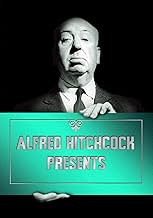The Big Switch
- Episode aired Jan 8, 1956
- TV-14
- 30m
Gangster Sam Dunleavy sets up an elaborate alibi so that he can kill his ex-girlfriend Goldie, who left him for another man.Gangster Sam Dunleavy sets up an elaborate alibi so that he can kill his ex-girlfriend Goldie, who left him for another man.Gangster Sam Dunleavy sets up an elaborate alibi so that he can kill his ex-girlfriend Goldie, who left him for another man.
- Director
- Writers
- Stars
- Director
- Writers
- All cast & crew
- Production, box office & more at IMDbPro
Featured reviews
And "The Big Switch" did turn out better than expected. It is slightly disappointing in terms of being top 'Alfred Hitchcock Presents' standard, plot-wise it is nothing wholly remarkable. It is though a lot of fun as an episode and benefits greatly from its lead performance. "The Big Switch" is another one of the entries that is noither one of the best of the season or show or the worst on both counts, but more just scrapes the high middle category.
The story is nothing exceptional, it is short on suspense and surprises, so slightly bland atmosphere-wise, and can be rather contrived. A feeling that gets on the over the top side in the final act, which did feel like more time was needed to flesh it out more.
However, "The Big Switch" benefits hugely from the twinkling larger than life lead performance of George Matthews. The rest of the cast do very well too, if not on Matthews' level and their roles are not as interesting. Weis' direction is far from routine and there is an ease. What is also good is the script writing, which is very tongue in cheek and genuinely humorous. It is not the lean, tough sort of script, but it does show again that 'Alfred Hitchcock Presents' could do tongue in cheek and humour well.
Which was always evident anyway in Hitchcock's droll bookend scenes. It's a well made episode visually, with some lovely atmospheric shots, and the theme music is as usual wonderfully devillish. And despite not being wowed by the story, it is not a dull one and it has its charm. The character chemistry is done well.
Concluding, liked it but not loved it. 7/10.
The best thing about this episode has to be the presence of veteran actor George Mathews, he eats up the screen with his witty dialogue and rugged looks which make him come off perfectly as the 1930's gangster type. As for that there's really nothing here and all you really whined up getting is episode six "Salvage" with some different results, an added in alibi plot, and an OK ironic twist. It's not a bad episode at all and much like reviewer hitchcoc stated if your going into it not thinking to much then you'll probably enjoy it for what it is an OK episode with a strong lead actor.
The story's okay even if the upshot seems more contrived than usual. Actually, the cast is the real draw. The Runyonesque Mathews is always a colorful character with his fractured grammar of "deese" and "dem", along with a face that looks like ten miles of bad road. Then there's Beverly Michaels on leave from one of Hugo Haas's sleazy bad movies. Together, they're like a marquee team from Guys and Dolls. And catch James Edwards in a small bartending role. He was one of the first African-Americans to get dignified roles, even before Sidney Poitier. His lead role in 1949's Home of the Brave was a landmark shattering of Black stereotypes. Too bad his role here is not bigger. All in all, it's a colorful half hour, even if not top rank.
Did you know
- TriviaThe password to enter the speakeasy is "Manassa Mauler," a nickname for Jack Dempsey, the world heavyweight boxing champion from 1919 to 1926.
- GoofsWhen Goldie turns on a table lamp and Sam slams the door to trap her in, the camera moves in front of the lamp, throwing the shadow of the whole moving camera apparatus on the door behind Sam - a terrible lapse by the lighting director.
- Quotes
[last lines]
Himself - Host: Well, as they say in San Quentin, that's the way the little pellet drops. Now, if only Dunleavy had killed Goldie he could have accounted for his actions at the time of Barney's accidental death. But then, suppose the police started asking questions about Goldie. And now for some of those delightful words from our sponsor after which, I'll be back.
[commercial break]
Himself - Host: I'm afraid that's all the commercial we have time for this evening. But we shall be back next week with some more. And, uh... Oh, incidentally, uh, if there's time we also, uh, plan to tell you another story.
- SoundtracksFuneral March of a Marionette
Written by Charles Gounod
Details
- Runtime
- 30m
- Color
- Aspect ratio
- 1.33 : 1














